10 Best Electronic Signature Apps For 2024 (Free + Paid)

What’s the best electronic signature app on the market?
We wanted to find out, so we tested all the leading tools and picked out our top 10 favorites.
Whether you just want an easy, secure way to sign important documents yourself, or you’re looking for a solution that lets you send signature requests and manage paperwork at scale, you’ll find something suitable in this list.
The best electronic signature apps – comparison
TL;DR:
- Signaturely – Best electronic signature app for simplicity and affordability.
- signNow – Best electronic signature app for SMBs and enterprises. Ideal for those who need more complex workflows.
- CocoSign – Best eSign app to use on a PC / desktop.
- SignWell – Best free forever plan. Includes templates and document workflows.
#1 – Signaturely
Signaturely is my top pick for the overall best electronic signature app. It’s super simple to use and affordable, which is why I use it for all my own contracts.
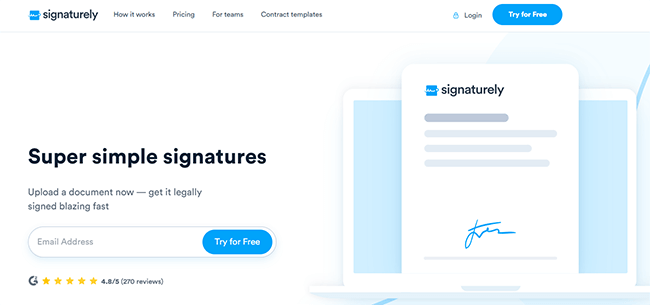
Sometimes, you just want to add/get a signature and move on with your life—and that’s why I like Signaturely so much.
Unlike a lot of other electronic signature apps, it doesn’t complicate things with a bunch of fancy features that no one actually needs. It has a super simple and straightforward workflow that takes the hassle out of getting documents signed, so you can get stuff done faster.
All you have to do is upload the file you want signed (or create a document from one of the built-in templates).
Then, add your required fields (e.g. a signature box, date box, checkboxes, etc.) in the point-and-click editor, and send it to your signers.
Once received, the signer just has to click on the link in their email and can quickly and easily fill it out on any device. They can type their signature using their keyboard, draw it, or upload it without ever leaving the app.
If they’re dragging their heels, they’ll get an automatic reminder from Signaturely to hurry them along.
When it’s done, the paperwork comes back to you fully signed and is stored in your Signaturely account for easy access.
All the data and eSignatures you collect through Signaturely are legally binding (with the same legal standing as handwritten signatures), and there’s a full legal audit log in case you ever need it.
Key features
- Signature requests. Send documents out to be signed individually or in bulk.
- Guided signing. Signature guides signees to complete the documents and lets them type, upload, or draw their signatures in the app.
- Contract templates. Create the documents that you need to be signed faster using Signaturely’s customizable contract templates.
- Document management. Track, store, and manage all your paperwork in one place.
- Team collaboration. Add team members to your account with custom access permissions to collaborate on documents.
Pros and cons
Pricing
Free plan available. Paid plans start from $20/month, save 35% with yearly billing. Get started with a 7-day free trial.
#2 – signNow
signNow is our runner-up pick. It’s the best choice for SMBs, enterprises, and any users who need more complex signing workflows.
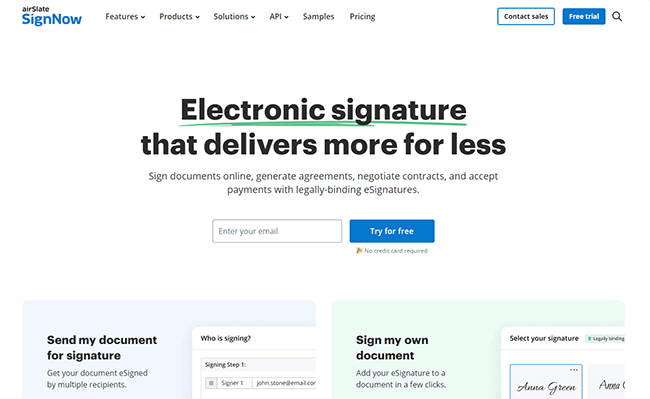
Like Signaturely, signNow has all the tools you need to request and create legally binding eSignatures on any device in seconds.
One of the reasons it’s such a good choice for SMBs is that businesses often need to collaborate on their paperwork, which means adding multiple users to your plan—and signNow’s cost-per-user is very reasonable
A lot of other electronic signature apps charge through the nose for plans that include lots of users, but signNow is just $20/user/month (or $8/user/month if you pay annually), making it super affordable.
Once you’ve added team members, it’s easy to collaborate on sharing, signing, and completing documents. You can streamline workflows by sharing document group templates, and keep track of your team’s progress from one dashboard.
I really like that signNow supports conditional workflows too. You can organize your documents into groups and send them to signers in role-based orders (i.e. first two recipient one, then to recipient two, and so on. This comes in super useful if you need to have one document signed by multiple people.
Key features
- Legally binding electronic signatures. Easily and securely sign electronic documents, or send out eSignature requests.
- Reusable document templates. Access unlimited templates for different document types, or create your own custom templates to save time
- Team collaboration features. Add multiple users to your account and collaborate on your paperwork
- Mobile apps. Sign documents on your mobile or tablet device through signNow’s iOS and Android apps.
- Integrations. signNow offers integrations with 20+ apps including Zapier, CRMs, and storage services. Plus, use the REST API to seamlessly integrate eSignatures into your own website or apps.
Pros and cons
Pricing
Plans start from $20/user/month and save up to 60% with annual billing. Get started with a free trial.
#3 – CocoSign
CocoSign is the best electronic signature app to use on a PC or desktop. It doesn’t have a mobile app like signNow but the browser app is super easy to use.
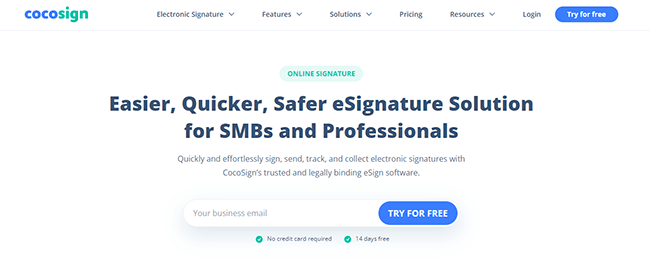
If you just want to electronically sign a document with CoCoSign, the process couldn’t be simpler.
You don’t even need to sign up for an account: Just go to the website and upload your file (PDF, PNG, DOC, etc..). Next, drag and drop a signature block onto the document, and then type, draw, or upload an image to sign it, and download it to your device. Easy.
Of course, it can do a lot more than that. Users can also draft documents with fillable fields (from scratch or one of CoCoSign’s ready-made templates) and send out signature requests to multiple recipients.
When drafting a document, you can let CoCoSign know when you want it to send automatic reminders (e.g. every 3 days, 7 days, etc.) to keep it at the top of the signers’ inbox.
CoCoSign guides signers to help them complete their signatures and tracks the status of every request in real-time.
From your account, you’ll be able to see the status of every piece of paperwork you’ve sent out at a glance, such as whether it’s been mailed, viewed, signed, declined, voided, or fulfilled.
You’ll also be notified via email when any document is signed with details like the IP address, time, etc.
Key features
- Online document signing. Electronically sign documents quickly and easily from the online app
- Signing link. Request and collect electronic signatures faster with a document signing link
- Paperwork tracking & management. Track the signing status of your documents in real-time and manage all your paperwork in one place.
- Bulk sign requests. Send one document out to multiple signers at the same time
- Audit trail. Make sure your electronic signatures hold up to legal scrutiny by recording and validating signing activity through timestamps, document IDs, saved IP addresses, etc.
Pros and cons
Pricing
Free plan available. Paid plans start from $12/month, and save up to 46% with annual billing.
#4 – SignWell
SignWell has the best free forever plan of any electronic signature software we’ve tried. It lets you get up to 3 documents signed per month, so it’s a good choice for low-volume users.
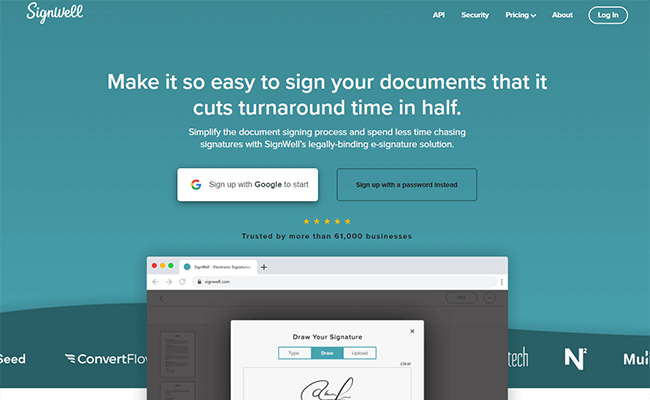
I like the fact that SignWell doesn’t gate important features behind paid plans. You still get access to features like automated reminders, document workflows (status tracking), and templates even as a free user.
Uploading/creating documents and adding fields for signatures is a cinch. And to save time, you can turn any document that you’ve already prepared into a template, and reuse it again and again.
It gets even better for paid users. Certain plans unlock even more advanced features like bulk sends, template links, data validation, in-person signing, and so on. Plus, send unlimited documents and templates as a Business user.
SignWell gets top marks when it comes to integrations too. It connects seamlessly to all the apps you already enjoy, including Gmail, Dropbox, Slack, and over 5000+ more.
Key features
- Electronic signature requests. Send out documents for signing with status tracking and automatic reminders and notifications.
- Audit reports. View timestamped activity history on all documents with detailed reports that are compliant with US and international eSignature laws
- Fully guided signing. Make it easy for recipients to sign documents with a guided signing experience
- Templates. Save your documents as templates to save time and improve efficiency.
Pros and cons
Pricing
Free plan available. Paid plans start from $10/month, and save up to 20% with yearly billing.
#5 – Dropbox Sign
Dropbox Sign is Dropbox’s own electronic signature app. So naturally, it offers the best integration with cloud storage services.
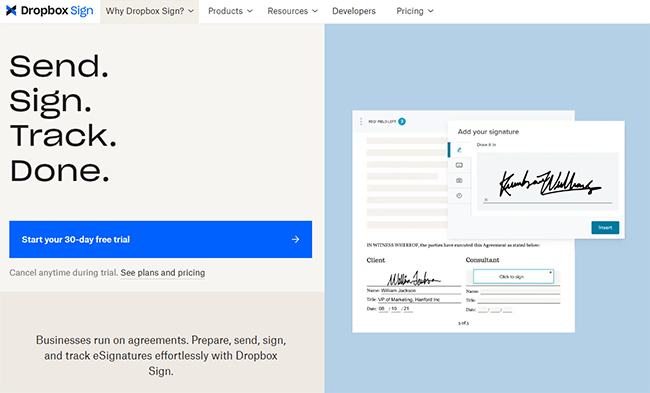
You can upload and sign files directly from your Dropbox storage, as well as from places like Google Drive, Gmail, OneDrive, etc.
If you’re sending out signature requests, you can prepare your documents first by adding custom fields for things like signature blocks, dates, text fields, checkboxes, etc. And what’s cool is you can add validation rules to ensure you get only accurate information from your signers.
Each document is digitally sealed after signing to make it tamper-proof, and full audit trails are retained to provide proof of document access and signing. All that helps to make sure that your electronic signatures can hold up to scrutiny should you ever need to prove their validity in court.
Aside from that, Dropbox Sign comes with all the other features we like to see in electronic signature apps, including custom branding, reusable templates, bulk sending, reporting, reminders and notifications, team management, etc.
Of all the apps we’ve tried, it’s also one of the few that support multiple languages (22 in total).
Key features
- Document management. Prepare your documents by adding custom fields and signature blocks, and store and manage all your signed paperwork.
- Electronic signing. Tools for signing documents electronically and sending out requests for signatures.
- Security features. Digital sealing/tamper-proofing, full audit trails, and more to make sure your eSignatures are secure and legally compliant.
- Reusable templates. Save your documents as templates so you can use them again and again without having to start from scratch.
Pros and cons
Pricing
Free plan available. Paid plans start from $15/month, and discounts are available with yearly billing. Try paid plan features free for 30 days.
#6 – DocuSign eSignature
DocuSign eSignature is probably the most popular electronic signature app on the market, with millions of users—and that’s one of its biggest strengths.
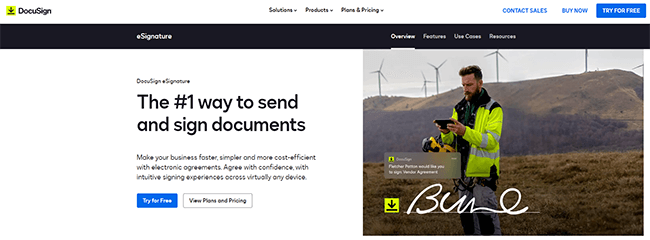
You see, one of the problems with sending signature requests is that, when signers receive an email requesting their signature from a source they don’t recognize, they may be hesitant to fill out the form. And that can lead to unnecessary delays in getting important paperwork completed.
But your employees, vendors, and business partners are more likely to trust signature requests that come from a familiar, recognizable name like DocuSign than other apps.
It’s super easy to use too. Users can quickly sign agreements on any device in an intuitive interface, either through the mobile app or the web app. And security features like enhanced signer identification and threat detection help to ensure those agreements are protected.
Teams can quickly prepare paperwork with with dynamic document generation, and collaborate through shared templates, comments, and customizable workflows.
DocuSign integrates well with all the tools you already use, including Google, Zoom, Salesforce, etc.
Key features
- Electronic signing. Sign electronic documents securely and easily in an intuitive app.
- Activity tracking. Monitor the status of all your agreements to keep track of progress.
- SMS & WhatsApp delivery. Send out signature request notifications to your signers’ mobile devices.
- Reusable templates. Save time and reduce the risk of human error with reusable templates complete with custom fields and routing workflows
Pros and cons
Pricing
Free plan available. Paid plans start from $10/month, save money with yearly billing. Get started with a 30-day free trial.
#7 – SignEasy
SignEasy is—true to its name—one of the easiest electronic signature apps to use.
You can use it to sign paperwork, send out signature requests, and track and manage all your contracts.
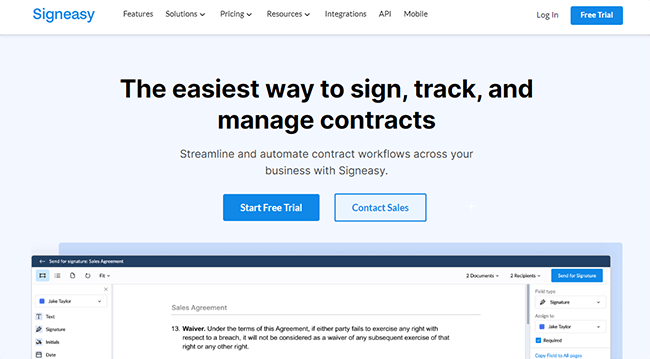
Preparing contracts for signatures is easy with SignEasy: Just add custom fields in the intuitive editor for signers to fill out. You can also import documents from cloud storage, and save prepared documents as reusable templates.
You can share your documents with signers via email or shareable links and QR codes. Plus, sign and send through the mobile apps, web app, or directly from your favorite tools (e.g. Gmail, Outlook, Salesforce, etc.).
Reporting tools tell you the status of every contract you’ve sent in real-time, as well as metrics like your average completion rate, average time for completion, etc.
I also like that Signeasy offers a more generous money-back guarantee than most of its competitors. You can get a refund within 100 days if you’re not satisfied (just make sure you check the terms and conditions).
Key features
- Secure electronic signatures. Collect legally-valid esignatures that are compliant with regulations like the ESIGN Act and eIDAS.
- Streamlined document workflows. Speed up turnaround times and improve efficiency with document workflows
- Drag and drop fields. Prepare your documents by dragging and dropping 10+ pre-made data fields.
- Reporting and analytics. Keep track of all your sent documents and analyze everything with overview metrics.
Pros and cons
Pricing
Plans start from $12/month, and discounts are available with yearly billing. Get started with a free trial
#8 – Adobe Acrobat Reader
Adobe Acrobat Reader is the best free document signing app. Use it to electronically sign PDFs from your Windows PC.
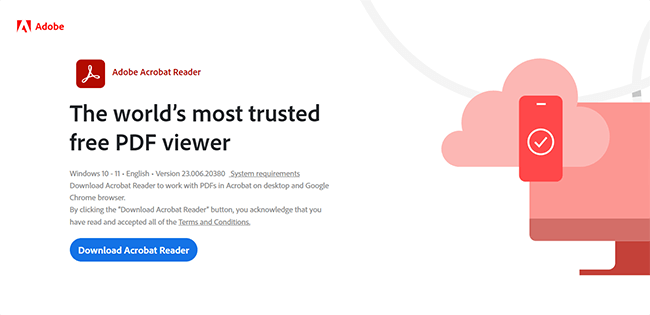
Unlike the other tools we’ve looked at so far, Adobe Acrobat Reader isn’t a full electronic signature solution.
It’s a very basic PDF reader that you can download and install on your Windows PC, but you can use it to view and sign PDF documents for free.
If you have a touchpad, you can draw your digital signature in Adobe Acrobat Reader. If not, you can type it out on your keyboard in a nice cursive font that looks like it’s been handwritten. Alternatively, take a photo of your signature, upload it, and add it to the PDF that way.
Once you’ve signed your PDFs, you can store and access them from any device through the Adobe Acrobat Reader app or Chrome extension, and grab a link to share.
Key features
- PDF viewing. Download Adobe Acrobat Reader to view, edit, and comment on PDFs from your Windows device.
- Multiple ways to sign. Electronically sign your documents in Adobe Acrobat Reader by drawing, typing, or uploading a photo.
- File storage and sharing. Store your PDFs online and share a link with others.
- Chrome extension. Electronically sign documents from your browser with the Chrome plugin.
Pros and cons
Pricing
Adobe Acrobat Reader is free to download and use.
#9 – PandaDoc
PandaDoc is another solid electronic signature solution that makes it easy to create, manage, and e-sign documents.
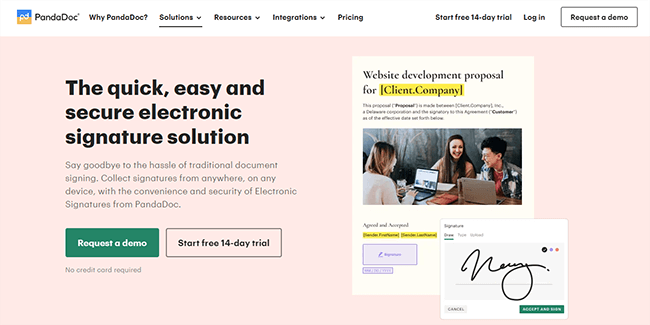
There are a few things I like about PandaDoc.
First off, it’s one of the only eSignature apps I’ve tried that gives you the option to take payments directly from the forms you send as it integrates with all the leading payment gateways (PayPal, Stripe, etc.).
This is ideal for contractors who need to charge their clients at the point of signing the contract.
I also love PandaDoc’s document builder. It’s much more powerful and flexible than most, with 750+ pre-built free templates, and tons of content blocks to make the process a lot faster.
On top of that, it also comes with a bunch of advanced features that business users need, like approval workflows, real-time document tracking and notifications, conditional logic, audit trails, and so on.
And what’s more, it offers a super generous free plan. You can sign an unlimited number of documents and request up to 3 signatures a month for free. Plus, store all your documents on the cloud.
Key features
- Document builder. Create the documents you need signing with a powerful, easy-to-use, drag-and-drop builder.
- Payments. Charge clients and take payments at the point of contract from within your documents thanks to integration with leading payment gateways like PayPal, Stripe, and more.
- Easy electronic signing. Easily add your signature to paperwork and fill out forms in an intuitive interface.
Pros and cons
Pricing
Free plan available. Paid plans start from $35/month, and save up to 46% with annual billing. Get started with a 14-day free trial.
#10 – DocHub
DocHub is another app that lets you edit, sign, and share PDF documents online. It stands out for its generous free plan and deep integration with the Google ecosystem.
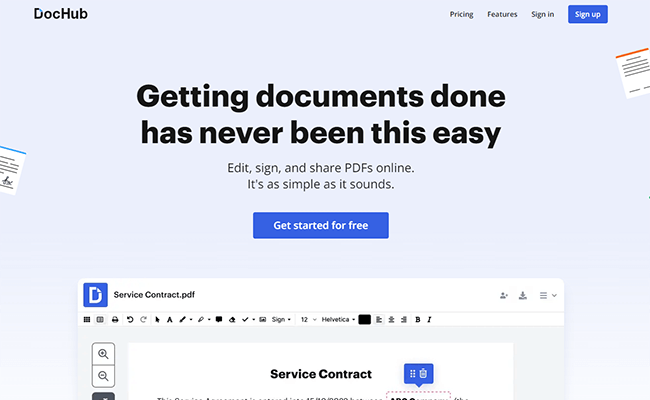
My favorite thing about DocHub is how well it works with Google products. You can build and edit your PDF files in Google Workspace, and sign email documents in Gmail in seconds.
It comes with robust team collaboration features including synchronized editing, custom user roles, and permissions.
Plus, all the other features businesses need to manage their paperwork, like security features, reporting, reusable templates, etc.
I also like that you can specify multiple signers for your documents and send out requests in order, or all at once, then receive instant notification as soon as it’s completed.
Key features
- Sign documents. Import documents to DocHub for easy signing, or sign them directly from your Gmail inbox with drag-and-drop signatures
- Request signatures. Prepare documents with fillable form fields and send out signature requests.
- Multiple signer workflows. Get your documents signed by multiple people in order or all at once.
- PDF editing. Build your documents in a powerful PDF editor loaded with form fields, annotation tools, and templates.
Pros and cons
Pricing
Free plan available. Pro plan costs $14/month, save up to 29% with annual billing and try it free for 30 days.
Final thoughts
That concludes our comparison of the best electronic signature apps.
You can’t really go wrong with any of the options on this list, but the best choice for you will depend on what you plan on using it for.
For example, do you just want to sign the occasional document? Or do you need a solution to help you manage all your business paperwork and collect multiple signatures every month?
You’ll also need to consider whether you plan on using it alone or collaborating with a team, as well as the features you need, your budget, and more.
I’d suggest narrowing your options down to 2-3 tools and then taking advantage of the free trials to test them out before picking your favorite.
Disclosure: Our content is reader-supported. If you click on certain links we may make a commission.
